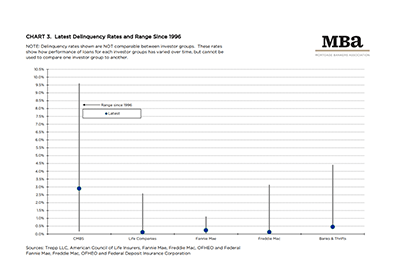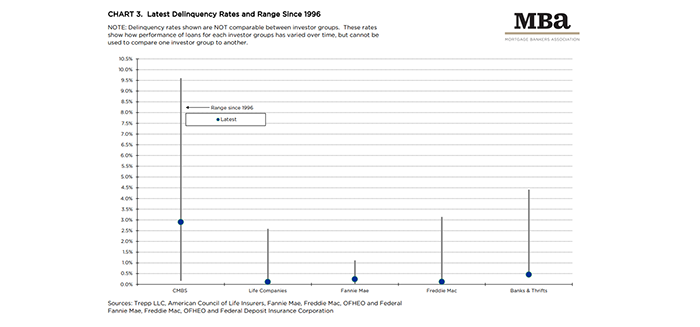
MBA: 4Q Commercial, Multifamily Mortgage Delinquency Rate Remains Low

Commercial and multifamily mortgage delinquencies remained low in the fourth quarter, according to the Mortgage Bankers Association’s latest Commercial/Multifamily Delinquency Report.
“There were slight upticks among loans in CMBS, life companies and banks and decreases for Fannie Mae and Freddie Mac, but the overall performance remained positive,” said Jamie Woodwell, MBA Head of Commercial Real Estate Research. “It is likely that as higher interest rates and softer property values work through the system this year – prompted by maturing and adjustable-rate loans – loan performance will adjust.”

Based on the unpaid principal balance of loans, delinquency rates for each group at the end of the fourth quarter were as follows:
• Banks and thrifts (90 or more days delinquent or in non-accrual): 0.45 percent, an increase of 0.01 percentage points from the third quarter of 2022;
• Life company portfolios (60 or more days delinquent): 0.11 percent, an increase of 0.02 percentage points from the third quarter of 2022;
• Fannie Mae (60 or more days delinquent): 0.24 percent, a decrease of 0.02 percentage points from the third quarter of 2022;
• Freddie Mac (60 or more days delinquent): 0.12 percent, a decrease of 0.01 percentage points from the third quarter of 2022; and
• CMBS (30 or more days delinquent or in REO): 2.90 percent, an increase of 0.13 percentage points from the third quarter of 2022.
The quarterly analysis looks at commercial/multifamily delinquency rates for five of the largest investor-groups: commercial banks and thrifts, commercial mortgage-backed securities, life insurance companies, Fannie Mae and Freddie Mac. Together, these groups hold more than 80 percent of commercial/multifamily mortgage debt outstanding. MBA incorporates the measures used by each individual investor group to track the performance of their loans. Because each investor group tracks delinquencies in its own way, delinquency rates are not comparable from one group to another. As an example, Fannie Mae reports loans receiving payment forbearance as delinquent, while Freddie Mac excludes those loans if the borrower is in compliance with the forbearance agreement.
Construction and development loans are generally not included in the numbers presented in this report but are included in many regulatory definitions of ‘commercial real estate’ despite the fact they are often backed by single-family residential development projects rather than by office buildings, apartment buildings, shopping centers, or other income-producing properties. The FDIC delinquency rates for bank and thrift held mortgages reported here do include loans backed by owner-occupied commercial properties. Differences between the delinquencies measures are detailed in Appendix A.
Click here to download the current report. To better understand the ways the COVID-19 pandemic is and is not affecting commercial mortgage performance, MBA worked with its servicer members to develop the CREF Loan Performance Survey.
For more information on the most recent results and the historical series visit https://www.mba.org/home/product/commercial-multifamily-loan-performance-survey-73258.
